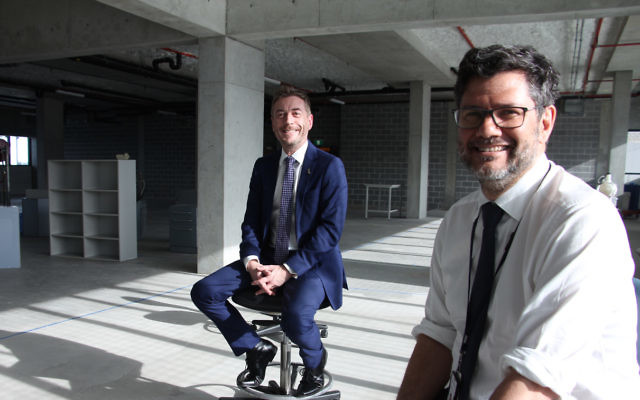Weizmann, Garvan at epicentre of science
Funding has been secured and installation work is underway for the $10 million Garvan-Weizmann Centre for Cellular Genomics in Sydney.

FUNDING has been secured and installation work is underway for the $10 million Garvan-Weizmann Centre for Cellular Genomics in Sydney, described by Garvan Research Foundation CEO Andrew Giles as “a scientific match made in heaven”.
The AJN was given a tour of the 800sqm site on the 11th floor of the Garvan Institute’s Kinghorn Cancer Centre last week, which is about to be fitted with next-generation genome sequencers, single-cell sorters and analysers, “hot-desk” collaborative research workspaces, an informatics analysis lab and a large refrigerated storage room.
Half funded by the NSW government with matching funds funds provided by Garvan with assistance from Weizmann Australia, the centre will be able to accommodate up to 50 researchers at a time and is due to open in April 2017.
It came out of a broader strategic research partnership signed between Australia’s Garvan Institute of Medical Research and Israel’s Weizmann Institute of Science during NSW Premier Mike Baird’s historic trade delegation visit to the Jewish State earlier this year.
Giles said the partnership is the biggest Garvan has ever entered.
“Its real strength is that we’ve got one of the largest cancer tumour bio-banks in the world, the only Illumina HiSeq whole genome sequencing machine in the southern hemisphere, and more than 600 scientists who specialise in genomic analysis,” Giles said.
“Weizmann is a world leader in single-cell genomics and also in biometrics and data visualisation.
“The equipment is about to be installed, we are looking to employ a centre manager, our people currently working in flow cytometry will be relocated here, and scientists from both our organisations can work here on a range of research projects – there are just so many possibilities.
“And this partnership is much more than this centre – Garvan has several Jewish scientists and as our partnership continues, there will be even more opportunities for exchange between our students and professors and Weizmann’s in Israel.”
Kinghorn Cancer Centre director and Garvan-Weizmann steering committee member Professor David Thomas said the centre’s work has the potential to develop new treatments for many different types of cancers and other diseases that respond directly to the cellular make-up of each patient.
“By taking a cancerous tumour apart from trillions of cells down to individual cell composition, we’re able to identify which are the most important cells, the ones that are likely to cause patients to die or to have a relapse, and tackle them,” Thomas said.
Earlier this month, the site was visited by one of the world’s leading single cell genomics experts, Weizmann’s Professor Ido Amit.
“I can now visualise how the centre is going to look,” Amit said.
“This partnership will bring the expertise of two great institutions together to open up new doorways in our understanding and application of cellular genomics.”
For more information, visit www.weizmann.org.au and www.garvan.org.au.
SHANE DESIATNIK

comments